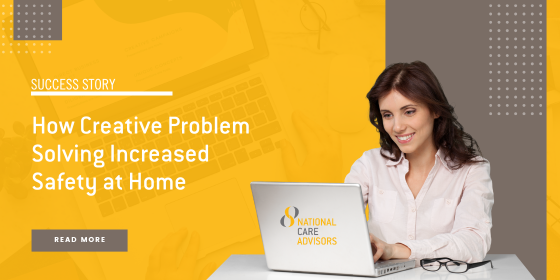NCA Success Story: How Creative Problem-Solving Increased Safety at Home

For individuals with physical disabilities, adaptive and assistive equipment is often vital to maintaining both safety and quality of life. In the home, adaptive equipment and mobility aids are typically a top priority for those with profound physical impairments that limit their ability to move, control posture, or perform daily activities.
For individuals with degenerative diseases or conditions that change over time, ensuring the home remains equipped with appropriate adaptive devices can be an ongoing challenge for family members and caregivers. As the condition evolves, so do the individual’s assistive needs. Having a home fitted with high-quality, up-to-date adaptive technology and equipment can greatly enhance independence and overall well-being, while also easing the physical and emotional demands placed on loved ones and caregivers.
An individual was originally referred to National Care Advisors in 2019 for a Special Needs Assessment and has continued to receive case management services ever since. The client, who has been diagnosed with Huntington’s Disease, is experiencing progressive neuromuscular decline. They live full-time with their grandparents, who serve as their legal guardians and caregivers, in the family’s over 100-year-old home. As the client’s mobility has decreased, they have become unable to walk and can bear only minimal weight. Consequently, they were often confined to their second-floor bedroom. To improve their mobility and quality of life, NCA coordinated the installation of a stairlift, allowing them to move safely and comfortably throughout the home.
Another major concern involved the client’s sleeping situation. Because of involuntary movements during sleep, they were at high risk of falling out of bed. To prevent injury, the family had removed the traditional bed frame and placed a mattress directly on the floor. They added a toddler gate and surrounding pillows as makeshift safety barriers, but the client often maneuvered underneath the padding, creating additional safety concerns. It soon became clear that a more secure and supportive sleep solution was urgently needed.
NCA Nurse Consultant Melissa contacted a company specializing in adaptive equipment to explore appropriate bed options, including a SleepSafe® bed. Unfortunately, due to the size and weight of the bed, the manufacturer was unable to deliver it to the client's home because of the narrow stairways typical of older homes. Determined to find a workable solution, Melissa reached out to a trusted contractor with whom she had previously collaborated. Together, they identified a solution. A fully electric bed was purchased. The contractor then built a custom bed surround with higher side rails and padded supports to enhance safety and comfort. The contractor delivered the bed in parts and assembled it in the client’s bedroom.


Today, the client sleeps safely in their new bed, and their caregivers can tend to them without physical strain. This solution has brought immense relief and joy to the client and their family, who are deeply grateful for the outcome.
This case is a powerful example of the creative problem-solving and compassionate advocacy that define NCA’s case management services. Every client’s situation is unique, and NCA’s Nurse Consultants are ready to meet each one where they are.
If you have a client or family member in need of assistance coordinating adaptive or assistive equipment in the home, contact National Care Advisors today.
